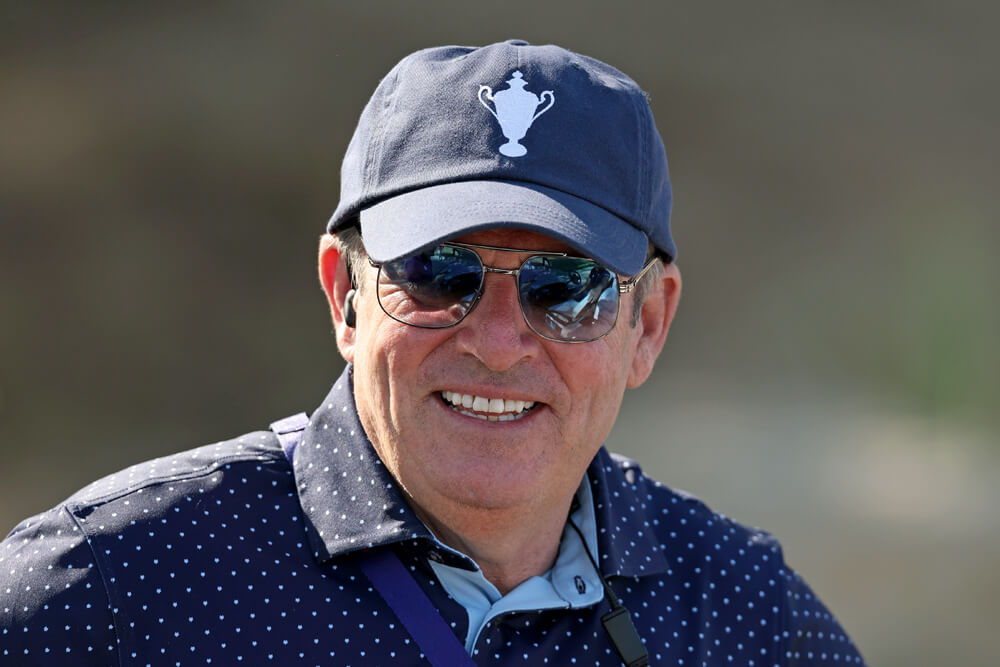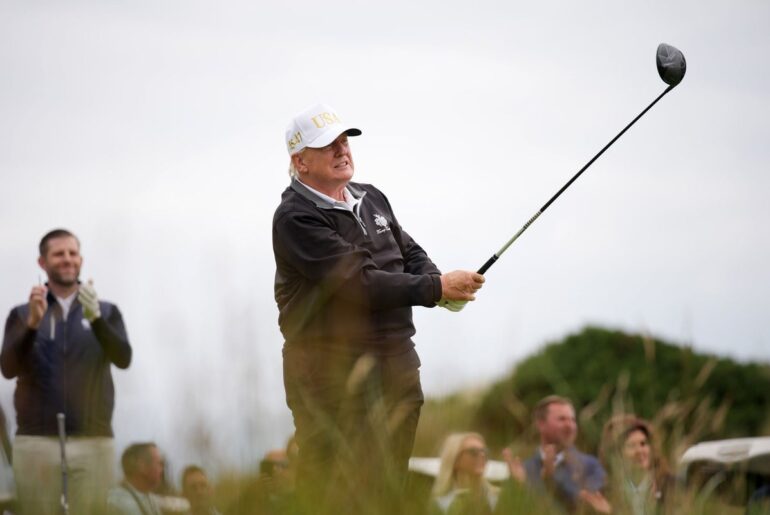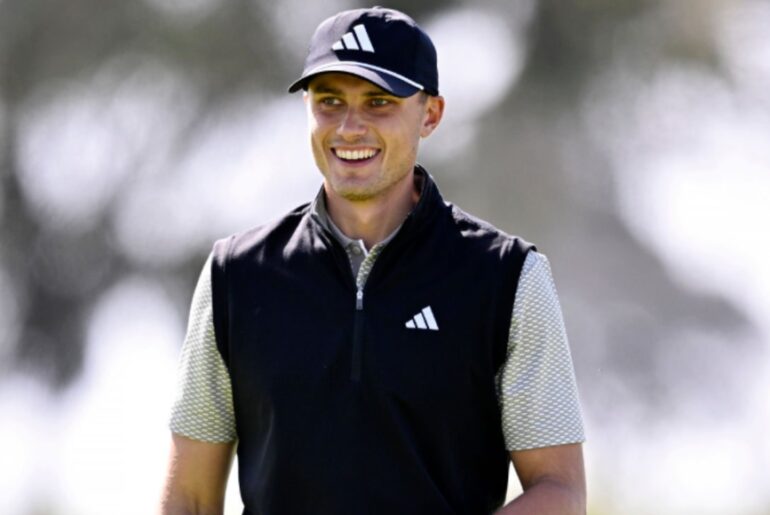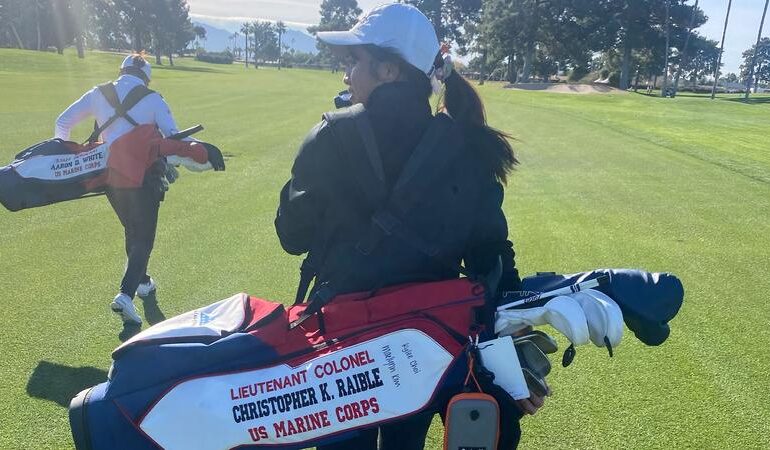Rich Lerner knows the cue. The red light is on and Brandel Chamblee is in the midst of a verbal dissertation on Golf Channel’s popular “Live From” show during the game’s biggest events when Paul McGinley, sitting to the left of Chamblee, locks eyes with Lerner.
It’s a subtle movement, even just a head nod, that says McGinley wants to tag himself in.
Given Chamblee’s conviction and combativeness, it is not a moment for the meek.
McGinley is many things but meek is not one of them.
“If Paulie has a counterpoint, he’ll look at me with a little smile like ‘Richie I’m coming,’” said Lerner, the anchor/moderator of “Live From.”
Occupying a seat alongside Chamblee and Lerner at major championships has afforded McGinley access to American audiences, who have embraced him. What has separated McGinley and made the 58-year-old Irishman one of the most popular and respected voices in the game is, quite simply, what he says.
“At 18, he’s a 4-handicap and 25 years later he beats Tom Watson at the Ryder Cup. What does that tell you about Paulie? People respect him. People follow him. People believe in him. That’s his gift.”
— Rich Lerner
It is painted with his Irish brogue and underpinned by a perspective grounded in Gaelic football and forged by a storybook golf life, one that began with McGinley flying eight time zones to convince the golf coach of a small private college he was good enough to play. More unlikely still, he would play in three Ryder Cups, securing the winning point in one of them and captaining the winning European side in a fourth.
Although that captaincy was 11 years ago at Gleneagles in Scotland, McGinley’s enduring influence is such that, between television gigs, he is the strategic advisor to captain Luke Donald’s 2025 European team at Bethpage Black, an oracle of sorts.
“I don’t want to diminish Paulie’s accomplishments but I maintain he’s one of the greatest success stories in the history of the sport,” Lerner said. “People look at me like, why would you say that about a guy who won four tournaments on the European tour?
“At 18, he’s a 4-handicap and 25 years later he beats Tom Watson at the Ryder Cup,” Lerner continued. “What does that tell you about Paulie? People respect him. People follow him. People believe in him. That’s his gift.”
The world is full of voices, most of them talking to hear themselves talk, but McGinley is different. He has a natural magnetism and he succeeds not by being the loudest or the most controversial but by being thoughtful, intuitive and likeable.
He spreads joy and optimism. At times, he comes bearing gifts in the television compound, a bottle of whiskey for Chamblee or Cadbury chocolates for Lerner during their weeks together.
McGinley speaks his own version of the English language, sprinkling in phrases such as “point the elbows” and “you’ve got to get on your front foot” and horse-racing idiom “runners and riders” – adding color to his commentary.
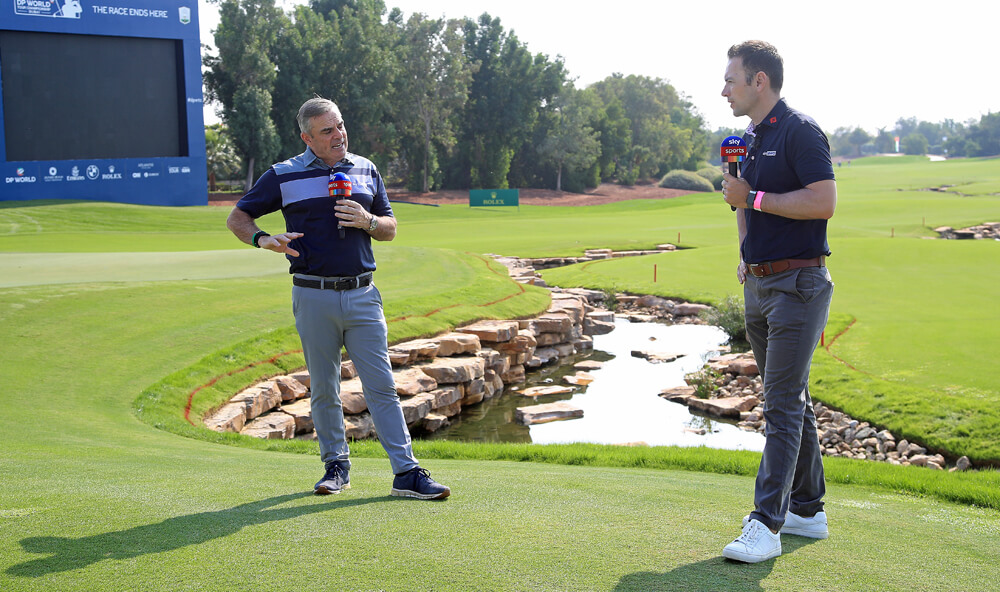 Paul McGinley (left) talks with Nick Dougherty of Britain’s Sky Sports, one of multiple outlets where McGinley dispenses his golf wisdom. Andrew Redington, Getty Images
Paul McGinley (left) talks with Nick Dougherty of Britain’s Sky Sports, one of multiple outlets where McGinley dispenses his golf wisdom. Andrew Redington, Getty Images
A different dream
It’s a long way from the Dublin suburb of Rathfarnham to being a globe-trotting television personality with homes in Ireland, Scotland, Portugal and the United States and various business interests sprinkled like salt and pepper on a rich meal. But McGinley embodies the notion that everyone runs his own race.
“I was a good Gaelic football player, and I had real dreams of playing top-level Gaelic football,” he said. “Then I broke my kneecap when I was 19. I couldn’t play football. I was on crutches for six months.”
In Ireland, Gaelic football is part of the culture, like cold winds and sheep in the fields. Play long enough and well enough for your county and you will rarely have to buy your own Guinness.
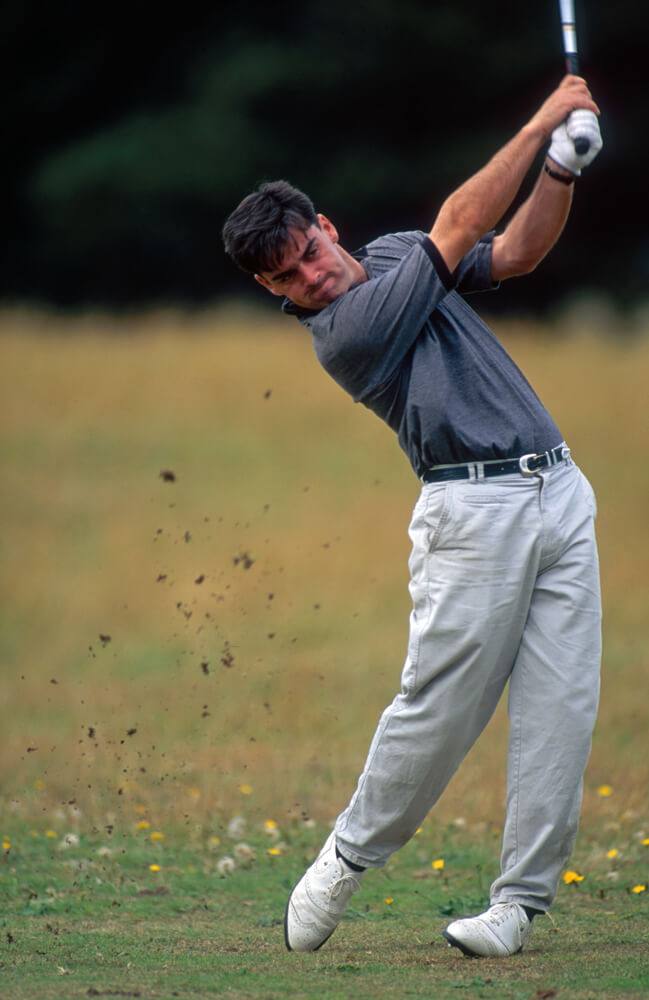 After coming to the United States to play golf, Paul McGinley was part of the 1991 Great Britain and Ireland Walker Cup team. David Cannon/Allsport, Getty Images
After coming to the United States to play golf, Paul McGinley was part of the 1991 Great Britain and Ireland Walker Cup team. David Cannon/Allsport, Getty Images
Like Shane Lowry’s and Pádraig Harrington’s fathers, McGinley’s father was an outstanding Gaelic footballer. Mick McGinley played for county Donegal within the Gaelic Athletic Association, which oversees hurling and football in Ireland. It is a parochial and passionate calling that McGinley still carries and it has fueled his life.
With football out of his future, McGinley spent three years at the Dublin Institute of Technology, then a year working first in Brussels and then in Dublin, learning the world of investments and stocks, figuring his future was in business and finance.
He was wrong. With time to focus on golf, McGinley quickly improved and his wanderlust kicked in. Hoping to play college golf in America, McGinley wrote letters to 25 coaches. The only one who answered was Gordon Severson, the men’s golf coach at the United States International University in San Diego.
Severson didn’t offer McGinley a scholarship, just an opportunity.
McGinley scraped together $12,000 and flew to southern California in January 1990. Upon landing in Los Angeles, he walked outside the airport to feel America for the first time.
“I’m sure I’d never seen a season that was anything but cold in January. So that’s how naive I was. And I remember walking right outside the airport, just standing on the sidewalk there to feel the heat,” McGinley recalled.
All McGinley knew of America was “Starsky and Hutch” and “Dallas” until he found himself one January day with his feet in the sand on a beach near San Diego. He took to it immediately, and his game traveled.
John Adams, a member of the university golf team, was among the first to meet McGinley.
“Coach said to me, ‘Go hit balls with this guy and let me know what you think,’” said Adams, still a close friend of McGinley’s 35 years later. “We hit balls at Torrey Pines and when we got back, Coach said, ‘What do you think?’
“I said, ‘His sound at impact is different from all of ours. I think you’ve found a hidden gem.’”
This was not college golf at the highest level. McGinley and his teammates had to return their golf bags and uniforms at the end of each season. When the team played a tournament in Oregon, they drove from southern California.
“My luck was just great. I had no money … no money. But somehow we survived, somehow we made it happen.”
— Paul McGinley
“Nothing was given to us and that was how we all were,” said Adams, who introduced McGinley to Mexican food – it started with Taco Bell – and still checks out the various bottles of salsa in McGinley’s refrigerator when he visits him in Florida.
Gaelic football imbued McGinley with a streak of toughness. He wasn’t so much a fighter as he was feisty, a characteristic that illuminates his television work.
“My luck was just great. I had no money … no money. But somehow we survived, somehow we made it happen,” McGinley said.
McGinley challenged himself to make the 1991 Great Britain & Ireland Walker Cup team or find another career path. He made the team and, 11 years later, McGinley clinched the Ryder Cup for Europe, the north star of a playing career that produced 10 worldwide wins but none on the PGA Tour.
At The Belfry in 2002, McGinley holed a 10-foot putt on the 18th green to secure the winning point for Europe, earning him not only an exalted place in the event’s history but a celebratory swim in the nearby lake. The image of McGinley, soaked to the bone, standing in knee deep water holding Ireland’s orange, green and white flag over his head still burns like a fever dream around Dublin and across the Emerald Isle.
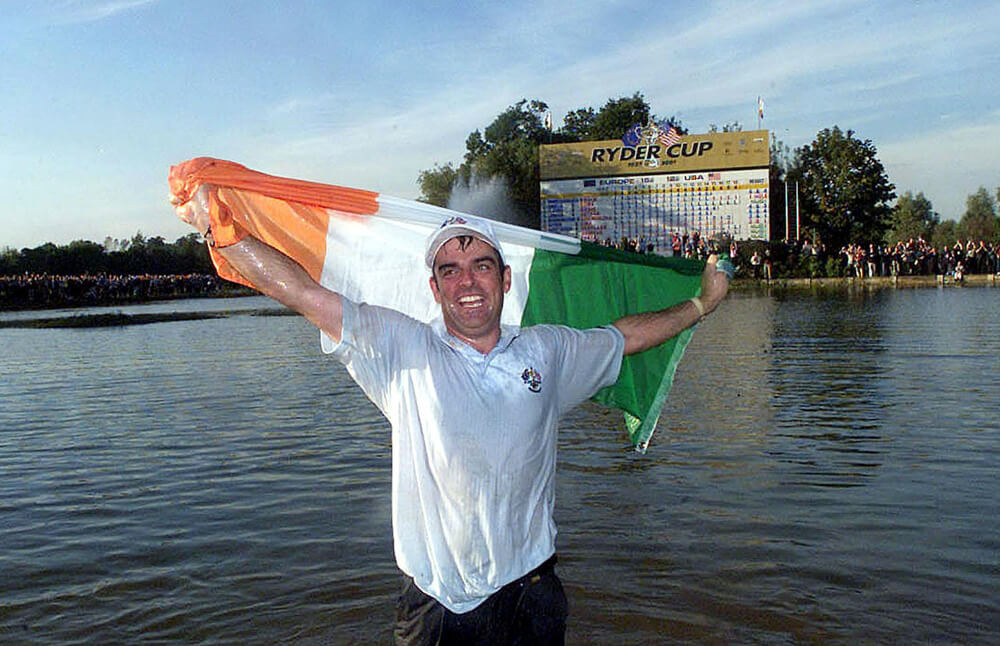 Paul McGinley celebrates after his putt won the 2002 Ryder Cup at The Belfry. David Davies , PA Images via Getty Images
Paul McGinley celebrates after his putt won the 2002 Ryder Cup at The Belfry. David Davies , PA Images via Getty Images
Bear for detail
When McGinley was chosen to captain Europe’s 2014 Ryder Cup team, it was transformational. It broke the pattern of major champions holding a monopoly on that role and it hastened the evolution of Europe’s Ryder Cup model. It also pitted McGinley against American captain Tom Watson.
“Paul did not have Tom’s major résumé or profile. To counteract this he became meticulous in every detail,” said Ken Schofield, executive director of the European Tour from 1975 through 2004.
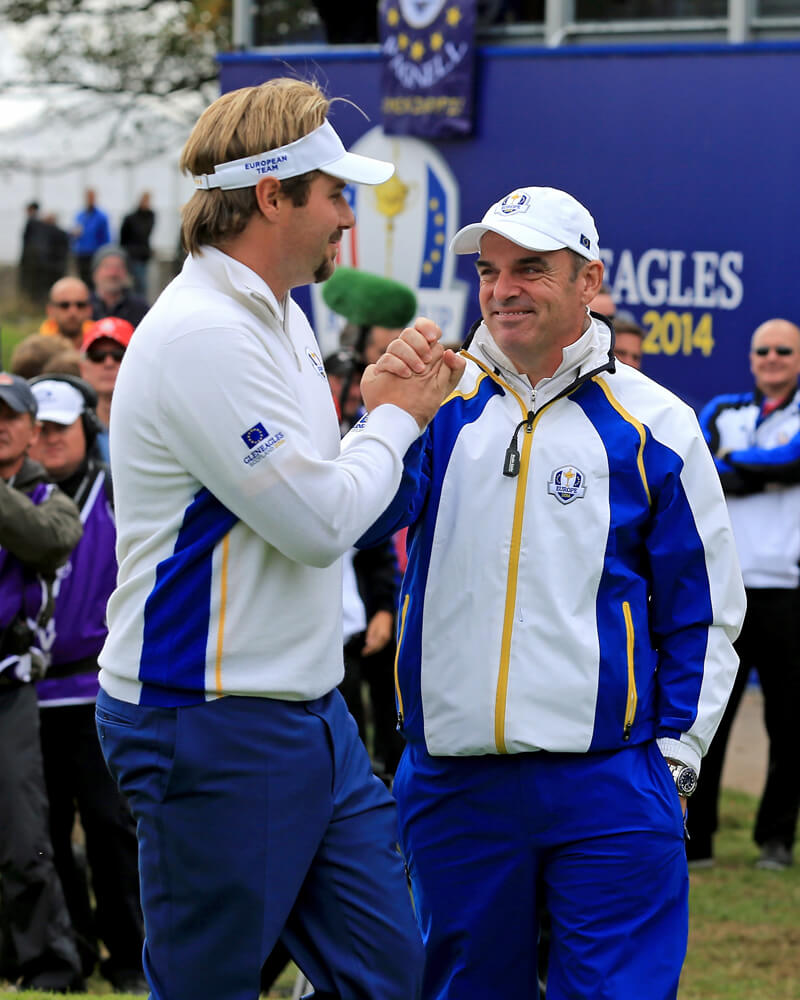 As 2014 European Ryder Cup captain, Paul McGinley (right) made it a point to get to know his players, including Victor Dubuisson, and what it took to get the best out of them. David Cannon, Getty Images
As 2014 European Ryder Cup captain, Paul McGinley (right) made it a point to get to know his players, including Victor Dubuisson, and what it took to get the best out of them. David Cannon, Getty Images
Rory McIlroy played the Seve Trophy in 2009 with McGinley as the team captain and immediately noticed the attention to detail. Fast forward to Gleneagles in 2014, when in his effort to be as thorough as possible, McGinley flew to Malaysia to watch Victor Dubuisson, a team member with a reputation for being difficult, to get a sense of who he was dealing with.
“The Dubuisson story is telling,” Lerner said. “There are no hard and fast rules. He’s trying to get the best out of you. How do you do that? You have to gain someone’s trust. To get someone to play for you, to do something for you. How do you do it? You have to try to understand who they are.
“Paul made it a point to understand who Victor was and what would unlock his best so that the team could be at its best.”
Seeing that Dubuisson had few people on his guest list compared to the other players on the team, McGinley made a point not to lose the individuals within the team concept.
He set the ground rules for Dubuisson – there would be mandatory one-hour team meetings each evening. After that, Dubuisson could go be with his friends. McGinley made sure they had dinner and wine each night; Dubuisson was the first player to their meetings.
“He understands what each individual needs,” McIlroy said. “He gave Victor the best room in the hotel so he and his three friends could go up there and play PlayStation. He treated Victor differently than he treated me.
“He knew how to get the best out of everyone, which I felt was amazing and part of the reason we did so well and part of the reason we keep him in that Ryder Cup role now.”
When the Europeans won the Ryder Cup, 16½-11½, at Gleneagles, McGinley was the conductor credited with bringing the music – to the tune of “Olé, Olé, Olé” – to life.
Of the many duties McGinley juggles – he works for Golf Channel, NBC Sports and Sky Sports in similar capacities at big events – the one that may be most personal to McGinley is the Ryder Cup, where he has become one of the wise men, a shaman of sorts, whispering in Luke Donald’s ear.
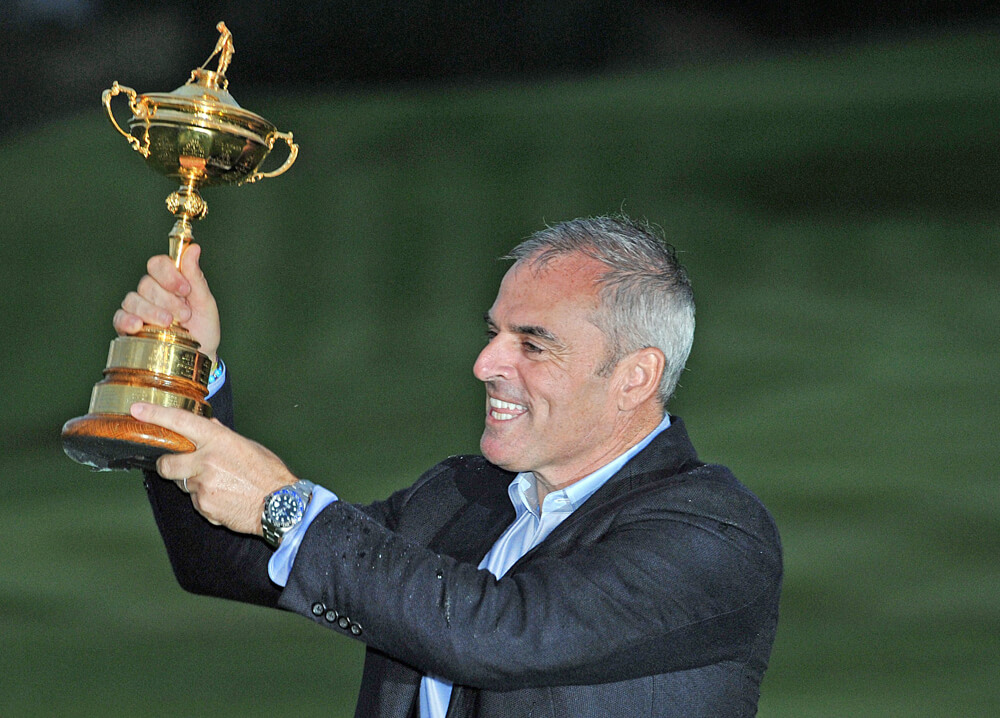 Paul McGinley hoists the Ryder Cup after leading Europe to victory in 2014. Glyn Kirk, AFP via Getty Images
Paul McGinley hoists the Ryder Cup after leading Europe to victory in 2014. Glyn Kirk, AFP via Getty Images
As the strategic advisor for Europe’s Ryder Cup team, McGinley has been deeply invested in plotting a plan to combat the Americans’ home course advantage at Bethpage while capitalizing on the collective strengths of a European team that looks strikingly similar to the one that won easily in Rome two years ago.
McGinley is still the Irish kid playing Gaelic football, only now he has translated the lessons and memories of those happy days into helping Europe win the biggest event in golf.
“We had some great stuff going on before I was captain and we had great success,” he said. “We’ve got good talent. What I felt was that although we had great captains, we didn’t really have a structure. And I’d like to think that I brought that structure, I pulled all the threads together to kind of create a template of what we do in Europe, and I identified it, and kind of made it quite clear and kept it simple and created a platform for the players to go and play, and all the stuff that goes with it.”
Energy and sensitivity
Part of what makes McGinley so good as an analyst is his ability, when the moment calls for it, to radiate sensitivity, empathy, compassion and humor. In the television compound, McGinley sees a team of equals, recognizing those behind the scenes are as important as the faces on camera.
It was Sunday night at the 2023 U.S. Open in Los Angeles and Wyndham Clark was on his way to the “Live From” set after winning. The sun was setting over Los Angeles Country Club, framing statistician Kevin Clark, on his computer in a nearby chair, in a golden light.
“Paul says ‘look at that. Isn’t that a beautiful scene,’” Chamblee said.
McGinley snapped a quick photo, had it blown up and framed then sent it to the statistician with the message, “We appreciate what you do.”
“That’s the kind of stuff he does,” Chamblee said.
McGinley didn’t find television so much as it found him after his Ryder Cup captaincy.
“The path that I followed is not the path that I thought. I thought I would have been more business-oriented,” McGinley said.
He thrives on the immediacy and the energy of live television. He reads whatever he can find about what’s happening in the game, works the range and talks to players and caddies. In his phone, McGinley has files of information on various subjects so he feels prepared for wherever the conversation might lead.
The camera’s red light does not intimidate McGinley. It relaxes him.
“It makes me think better. When we’re on live, I kind of like that. The rush of Brandel saying something, and I gotta react and I have no idea how I’m gonna react,” McGinley said.
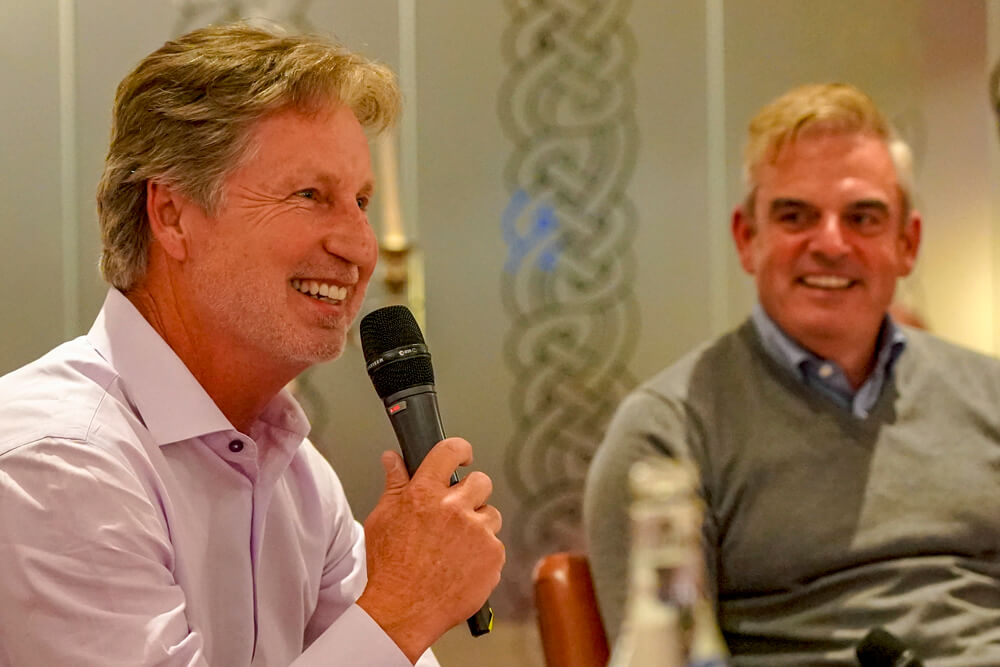 Paul McGinley (right) and his on-air sparring partner Brandel Chamblee each bring intense preparation and detail to their roles as Golf Channel analysts. Phil Inglis, Getty Images
Paul McGinley (right) and his on-air sparring partner Brandel Chamblee each bring intense preparation and detail to their roles as Golf Channel analysts. Phil Inglis, Getty Images
That, of course, brings us to Chamblee, Golf Channel’s brilliant and self-assured analyst who literally sits at the center of every discussion on the “Live From” shows. He comes as prepared as a courtroom litigator, has a college professor’s sense of perspective and likes few things more than matching wits with McGinley.
When McGinley was considering taking the seat alongside Chamblee on “Live From,” Adams offered him this counsel:
“I told him people like controversy. Just understand that if you’re going to disagree with Brandel, you’re going against somebody who does [his] homework.
“He’s going to make sure he has enough evidence to propose whatever he wants to say. If you’re against that, it’s OK but you better have enough information to be able to come at him.”
McGinley consumes information, talking with players and caddies, reading as much as he can and trusting what his eyes show him. His various careers are built on work and preparation.
“If you have a great friend, you can go toe to toe and argue your guts out and at the end say good points, hadn’t thought of it that way, let’s have a glass of wine.”
— Brandel Chamblee
Chamblee is made better by having McGinley beside him.
“He’s told me from the onset don’t ever hold back,” Chamblee said. “He’s aware of what makes good TV and I’m not saying he alters his point of view to make good TV but he loves a good debate. He doesn’t take pushback personally.
“If you’ve spent any time watching the way Parliament works in the U.K., there’s a lot of pushback. He grew up in an environment where voices can get pretty vehement. He wants a good debate. He understands that’s the job. We have healthy back-and-forths in our meetings and on the air and I never worry about him taking it personally or about him being offended by me having an opposing view.”
When Chamblee and McGinley engage with Lerner as a moderator, there is generally an outline of topics but there are no scripts. Both have done their research but the conversation is organic.
They argue over the distance the golf ball goes. LIV Golf. The 17th hole at the Players Championship.
And they still find time to have dinner together at least a couple of nights a week when they’re working together on site.
“We had a thorough exchange on the air about whether the PGA Tour needed to do more to expand globally. It was a thorough debate,” Chamblee said.
“At the end, I thought it was the most thorough debate we had. The next day he came in and said it was great. Let’s do it again.
“If you have a great friend, you can go toe to toe and argue your guts out and at the end say good points, hadn’t thought of it that way, let’s have a glass of wine.”
Individually, both are outstanding. Together, they become better.
McGinley uses his place in the game not as a pulpit but like a seat around a dinner table where the conversation crackles and smiles are served like dessert.
“He would have been a great lawyer. I say that to him regularly. I mean, he likes defending his position,” McGinley said of Chamblee.
“It’s a lot easier sitting with somebody who is full of opinions and full of wild things to say, and it’s easy to work off somebody like that. Somebody who thinks like you and says the same things as you, that’s harder to get a little bit of a dynamic going.
“I find that with Brandel. I don’t want to know what he’s going to say. I can guess. I mean, if it comes up on LIV or something, I know where he’s going to go, but in general, I’m listening intently on the desk to what he’s going to say because I don’t really know what he’s going to say. Now and again, he’ll throw things out of left field. I know that if I’m going to take on Brandel, I need to be ready.”
McGinley has a gypsy’s soul. He smiles at the memories of playing the European Tour, bouncing from country to country, chasing the dream and finding enough of it to be happy.
His days are full. He makes a point to talk to his family on a daily basis even as he “bobs and weaves” among his homes in four countries.
McGinley took a personality test years ago and it told him he thrives in a busy life but he knew that already.
“I invite pressure into my life. It drives people around me crazy. But I don’t know. I guess I like the challenge of it,” he said.
Forty years ago, McGinley’s dreams didn’t stretch far beyond his goal of being a Gaelic football player in Dublin but his ambition was limitless. It led him to southern California and, eventually, around the world. He played on three winning Ryder Cup teams and captained another to victory.
McGinley uses his place in the game not as a pulpit but like a seat around a dinner table where the conversation crackles and smiles are served like dessert.
“It’s funny,” McGinley said. “I’ve done so much in my life, and I’m walking around watching the guys playing practice rounds at the U.S. Open and I go, did I really do that? Did I really, really play in this tournament?
“Did I really play in the Ryder Cup? Did I really play on tour? Sometimes it’s like a dream: Was that really me?”
Yes, it was, the one and only.
© 2025 Global Golf Post LLC
Top: Paul McGinley has a natural magnetism and he succeeds not by being the loudest or the most controversial but by being thoughtful, intuitive and likeable. Richard Heathcote, Getty Images

